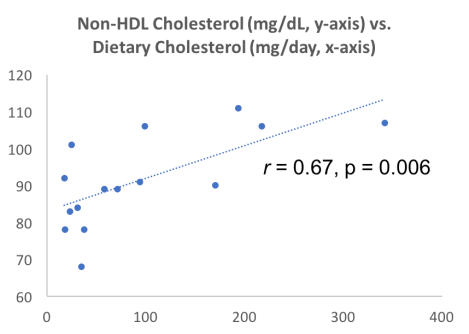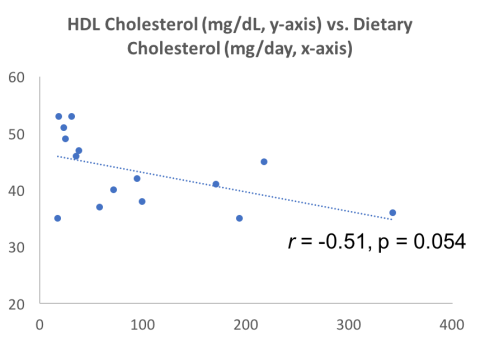With use of a food scale, I’ve been tracking my daily macro- and micronutrient intake every day since April 2015. In addition, I have 15 blood test measurements during that period, and accordingly, I’m able to examine correlations between my dietary intake with my circulating biomarkers. In this post, I’ll address the question, is my dietary cholesterol intake significantly correlated with plasma levels of cholesterol?
1. Plasma levels of total cholesterol vs. dietary cholesterol:

In the plot we see a borderline significant (p = 0.06), moderate correlation (r = 0.5) between my plasma total cholesterol with my dietary cholesterol intake. However, note that total cholesterol is comprised of “good” and “bad” parts, with HDL as the “good”, and with non-HDL cholesterol, including LDL and VLDL, as the “bad”. What does that data look like?
2. Plasma levels of non-HDL (LDL+VLDL) cholesterol vs. dietary cholesterol:

In the plot we see a highly significant (p = 0.006), strong correlation (r = 0.67) between my non-HDL cholesterol levels with my dietary cholesterol intake. It’s not possible to show causation via correlation, but this data suggests that my dietary cholesterol intake may be driving increased levels of non-HDL cholesterol.
3. Plasma levels of HDL cholesterol vs. dietary cholesterol:

In the plot, first note that in contrast with the positive correlations between total and non-HDL cholesterol with my dietary cholesterol intake, the correlation between HDL with my dietary cholesterol intake is negative (i.e., going in the opposite direction; r = 0.51), and borderline significant (p = 0.054).
Cumulatively, it looks like my dietary cholesterol intake may be related to increased “bad” cholesterol and decreased “good” cholesterol. As a limitation of this approach, although I’ve shown blood test data for 15 measurements (which is a decent sample size), I only have 4 measurements with an average daily cholesterol intake around 200 mg or greater. In the near future, I expect to average 200 mg of daily cholesterol (or more) per day, so let’s see if these correlations hold up!
If you’re interested, please have a look at my book!
I think you have previously mentioned that heart disease runs in your family – could that be a reason why dietary cholesterol has an impact on your plasma levels?
At any rate, your cholesterol numbers are all very low.
On a somewhat unrelated(?) note, can we expect a new “What I Eat” type post from you?
The older such posts are from 2015, and I’ve been wondering what your current diet looks like.
For example, what foods did you eat in the past 3 days, and in what quantities?
LikeLike
That’s possible, Zoltan. Also note that my Lp(a) has increased from ~40 mg/dL to 58 on my last measurement. That’s going in the wrong direction!
I’ll post a “What I eat” sometime within the next week. If I don’t, give me a kick as a
reminder!
LikeLike
Thanks, I will! If necessary, that is. 😉
58mg/dl is indeed high. My Lp(a) is 64 mg/l, so only 6.4 mg/dl – but I thought it was not supposed to respond to dietary changes?
LikeLike
I wish I had Lp(a) as low as that. From my experience, yes, it is difficult to modify Lp(a) levels with diet. However, that was before I tracked my diet…I’ve been heavily focused on using my diet to reduce my homocysteine, which I’ve reduced by ~30%, so now I’m going to focus on dietary correlates with Lp(a) levels, and see if I can address it like that. Also note that thyroid levels (I’m hypothyroid), and testosterone have been shown to reduce it, so I may go that route, sooner than later.
LikeLike
Fascinating study. Wondering how your blood plant sterol levels check out. Mine are on the high side indicating, I understand, a likely higher level of cholesterol absorption from dietary sources.
LikeLike
Good question, I haven’t focused on my plant stanol levels. I tend to focus on the big picture, i.e. circulating analytes that have been studied for 50-100 years+, like those found on the standard chemistry panel.
LikeLike